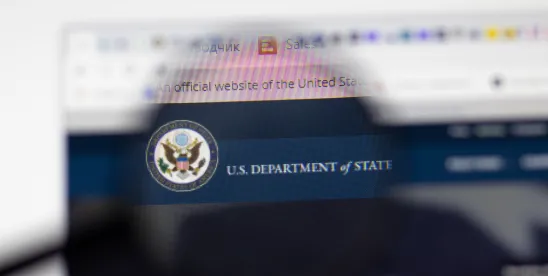On 1 May 2024, the US State Department’s Directorate of Defense Trade Controls (DDTC) issued a proposed rule to amend the International Traffic in Arms Regulations (ITAR) to support the goals of the trilateral security partnership among Australia, the United Kingdom, and the United States (AUKUS) (the Proposed Rule). The Proposed Rule will be set out in 22 C.F.R. § 126.7 (the AUKUS Exemption or the Exemption). This past March, the firm previewed this development here.
KEY TAKEAWAYS OF THE PROPOSED RULE
What is the AUKUS Exemption, and what will it do?
- The AUKUS Exemption establishes an exemption from certain ITAR license requirements applicable to Australia and the United Kingdom. The Exemption will enable the export, reexport, retransfer, or temporary import of defense articles, the performance of defense services, or the engagement in brokering activities, between or among authorized users within Australia, the United Kingdom, or the United States, subject to certain limitations.
What should US exporters in the defense industry know about the AUKUS Exemption?
- While the Exemption represents a positive first step by reducing export licensing requirements for certain transfers to Australia or the United Kingdom, US exporters should pay close attention to the limitations of the Exemption, particularly the list of exclusions described below.
- US exporters should note that even where defense articles are eligible for the Exemption, in circumstances where a contract value for such articles exceeds congressional notification thresholds, the Exemption no longer applies.
- The Proposed Rule provides expedited treatment for license requests for exemption ineligible defense articles. However, the potential for “RWA resets”1 may be a tempting recourse where there are license request backlogs approaching the timelines described below.
- The Exemption may provide helpful shortcuts to finalizing transactions by eliminating the need for marketing licenses and prior approval for demonstrations of certain excluded defense articles.
What are the next steps in implementation of the AUKUS Exemption?
- The next steps involve industry feedback on the Proposed Rule. The State Department requested comments on the “clarity and utility” of the Exemption and is accepting comments until 31 May 2024. A final rule is expected to be published by 17 August 2024.
THE ITAR AUKUS EXEMPTION
While the AUKUS Exemption removes certain licensing requirements, the Exemption is subject to noteworthy exclusions, limitations, and eligibility requirements.
Limitations and requirements
Most notably, certain defense articles and defense services, outlined in the proposed Supplement No. 2 to Part 126 of the ITAR, would be deemed ineligible for the Exemption. The following key items are excluded, absent technical data and defense services, in some cases:
- All items controlled under the Missile Technology Control Regime (MTCR), as annotated with an MT designation on the US Munitions List (USML),2 including certain nuclear weapons technologies, unmanned aerial vehicle systems, ballistic missiles, cruise missiles, space launch vehicles, among others, and directly related technical data and defense services;
- Certain uninstalled anti-tamper articles, and related technical data and defense services;
- Source code for certain weapons systems, warships, and engine control systems;
- Manufacturing know-how relating to certain explosives and weapons and significant military equipment (SME), generally;
- Classified know-how relating to electronic warfare and radar systems;
- Ammunition that is not an element of an armament, weapon, or military platform, and directly related technical data and defense services;
- Cluster munitions and articles specially designed for cluster munitions, and directly related technical data and defense services;
- Anti-personnel, anti-vehicle, and anti-armor land mine articles, anti-helicopter mines, naval mines, man-portable air defense systems (MANPADS), launch sites, and directly related technical data and defense services;
- Defense articles, defense services, and technical data for furazans explosives, RDX explosives, and oxidizers;
- Defense articles, defense services, and technical data related to naval nuclear propulsion systems;
- F-22 aircraft and articles specially designed for F-22 aircraft, and directly related technical data and defense services;
- Equipment to protect against thermal flashes associated with nuclear detonations, and directly related technical data and defense services;
- Certain classified articles for countermeasures and counter-countermeasures;
- Information security or information assurance systems and equipment;
- Cryptographic devices, software, and components;
- Certain guidance and navigation systems and directly related technical data and defense services;
- Certain chemical agents and biological agents, and directly related technical data and defense services;
- Classified spacecraft, space vehicles, and related articles, and directly related classified technical data and defense services;
- Articles related to nuclear weapons, and directly related technical data and defense services;
- Classified articles related to engine control systems, and directly related technical data and defense services;
- Electric submarine motors and related articles, and directly related technical data and defense services; and
- Manufacturing know-how directly related to various articles relating to underwater operations.
The AUKUS Exemption cannot be used for any transfers requiring certification to Congress under the Arms Export Control Act relating to certain notifiable direct commercial sales. In other words, proposed exports of defense articles authorized under the Exemption, but exceeding congressional notification values, fall outside of the Exemption and are subject to the existing licensing requirements and review timeline, expedited or otherwise. In the instance of some of the most significant transactions involving non-Supplement No. 2 excluded defense articles, the breadth of this exclusion appears to swallow the rule.
Generally, license applications are reviewed in a “first in, first out” order of priority unless special circumstances apply. However, the Proposed Rule incorporates new processes to expedite reviews of license applications for certain defense articles and defense services destined for Australia, the United Kingdom, or Canada. The timeframes would be 30 days for government-to-government transfers, and 45 days for all others. It will remain to be seen what recourse, if any, industry has when license applications approach or exceed these timelines, or whether there will be an increase in licenses RWA to reset the “regulatory clock.”
Australian and UK parties seeking to use the AUKUS Exemption will be required to undergo an enrollment process to become “authorized users.” Authorized users will then be listed on the DDTC website. US companies must be registered with DDTC to avail themselves of this Exemption, as is the case with most exemptions, and Australian and UK end users may request confirmation from DDTC of a US company’s registration. The Exemption stipulates it will provide confirmation of eligibility to Australian and UK end users prior to the transfer of the subject defense articles and defense services.
Recordkeeping requirements appear to be no more onerous than usual, and exports of SME still require nontransfer and use assurances. There is also an expansion of the intra-company, intra-organization, and intra-governmental exemption for classified transfers to authorized users or regular employees of an authorized user.
Exemption uses
Despite these limitations, the AUKUS Exemption is likely to have tangible benefits across a broad range of items. Of course, the exclusions are not exhaustive, and many items will be able to fully rely upon the AUKUS Exemption. Furthermore, even where certain defense articles are included within the scope of an exclusion, in some cases, technical data and defense services are not. The AUKUS Exemption could speed up the timeline for certain transactions where only defense hardware is excluded under Supplement No. 2.
For example, the exclusion for certain defense articles described under USML Category XI(a) (Military Electronics) does not extend to related unclassified technical data and defense services (as other exclusions do). Accordingly, at the preliminary stages of marketing an item or potentially providing demonstrations prior to making a sale (assuming temporary export of hardware is not required), the Exemption can be used to avoid certain preliminary license requirements, thereby speeding up the transactional process.
AUKUS REGULATORY PROGRESS
On 1 May 2024, each nation released their proposals for establishing export license exemptions for certain covered defense hardware, services, and technical data.
Australia released an exposure draft of the Defence Trade Legislation Amendments Regulations for public comment. The proposed changes would remove the requirement for approximately 1,100 defense export permits that would otherwise be required under current Australian export controls.
The United Kingdom released a draft open general export license creating an exemption for the export, reexport, or retransfer of defense articles among the AUKUS countries.
The Proposed Rule outlining the new AUKUS Exemption represents the U.S. government’s proposal.
AUKUS NEXT STEPS
To realize the goals of AUKUS, the member nations must now come to full agreement on which defense articles are exempt from export license requirements and which are excluded or limited. Within that window, the administration is also required to certify that Australia and the United Kingdom have similarly amended their respective arms export controls. Such certification is required to implement the Proposed Rule.
The firm's International Trade Team and Public Policy Group are actively monitoring the development of these regulatory changes and are available to answer any questions and assist in navigating this regulatory process.
1 Some licenses are returned without action (RWA) by DDTC for various reasons most often associated with errors in license applications.
2 MTCR guidelines establish technological thresholds that fasten additional controls under Category 1 and Category 2 as described here.






 />i
/>i
